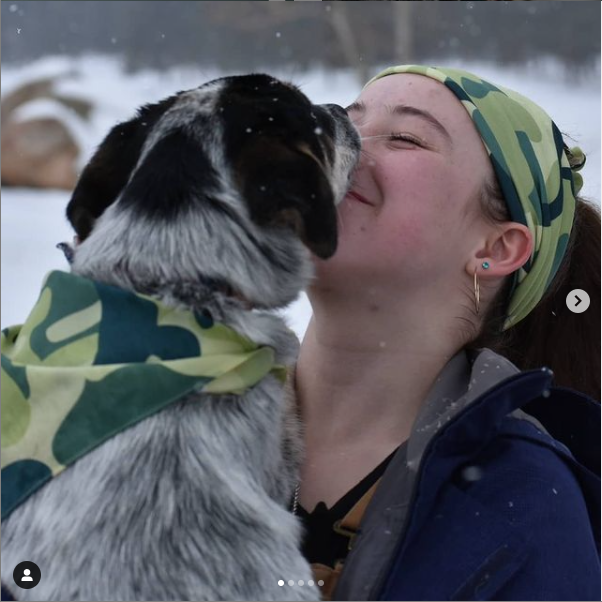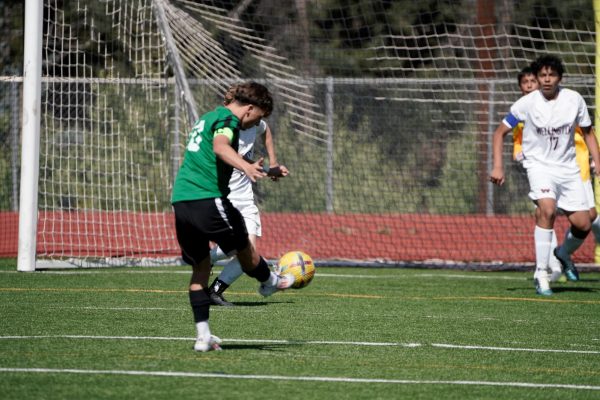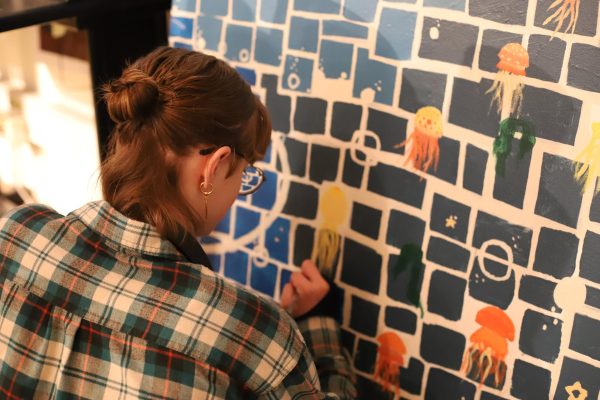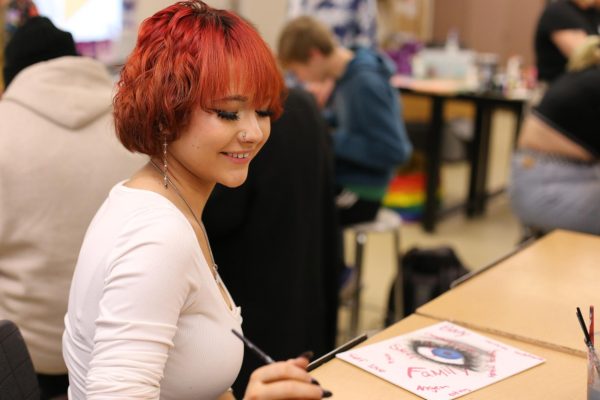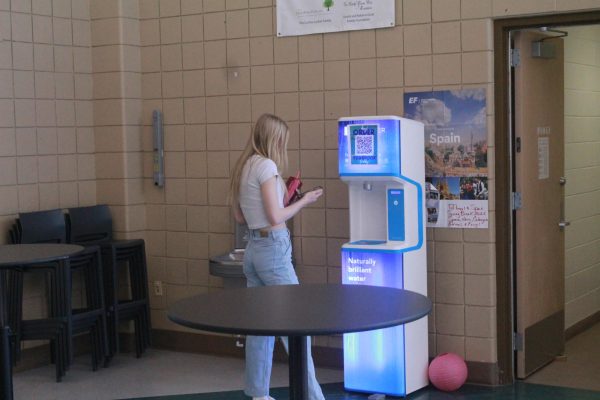Tipsy Talks
How a talking dog is helping her owner through trauma
Tipsy takes a break from playing in the snow to kiss owner and trainer Alexis Hall. “As I started working with her I realized she is incredibly smart, incredibly talented, and shows potential for so much more,” Hall said.
A six month old crosses the room, reaching for an assortment of shiny buttons.
After considering them for a moment, she strikes.
Thwack.
A furry paw meets the blue plastic.
“Food?” a speaker within the button announces, and the puppy before it sits back, eyes shining with satisfaction as junior Alexis Hall obligingly fills her bowl with kibble.
This is how Tipsy the cattle dog’s training began, but now, using the 14 buttons before her, she can speak in short phrases.
“I learn so much about her and her preferences,” Hall said. “She likes soaked food. She likes to play with this toy. It’s very interesting.”
The hours of training, cost of buttons, and research involved with this endeavor are taxing, but for Hall Tipsy’s training is about more than the novelty of a talking dog. She is on a mission to prove to herself and the world that dogs with a predisposition to aggression are just as capable of love.
“I started this because I went through a lot of grief and a lot of pain in a really short time period,” Hall said.
Last summer, following the divorce of her parents, Hall and her mother began fostering a litter of puppies in an effort to bring new life to the house. This is where Tipsy, along with her siblings, enter the picture.
“We had no idea what we were getting into,” Hall said.
After picking up the mother dog and her litter from New Hope Cattle Dog Rescue, an organization based in Aurora, it became clear that fantasies of puppy cuddles and endless playtime would need to be put on hold. The mother dog was feral, snapping at anyone who drew near, which made it impossible to even take her outside. Then came the parasites. All of the dogs were sick, requiring constant care, medication, and even emergency IV’s. Day by day, though, Hall and her mother nursed them back to health.
Unfortunately, they were not out of the woods yet. In addition to the puppies and their mother Hall had two other dogs. When the larger Akita, Imoto, began attacking their smaller dog Hall chalked it up to a disagreement over toys. Then things got worse. One day when Hall approached Imoto the dog attacked.
“She went for my throat, missed it by a centimeter, and latched onto my face,” Hall said. “I had to use my hands to pry her off of me.”
After a hospital visit and stitches, Hall stayed at her dad’s house for a while to put some space between her and the dogs.
“I was pretty traumatized by that. I’d been hurt by animals a lot growing up but this was the first time I didn’t understand why. I blamed myself,” Hall said.
While she was at her dad’s house Imoto continued behaving erratically, severely injuring her other dog and attacking unprovoked. The veterinarian began to suspect she had developed a chemical imbalance. Eventually, the Hall family began to discuss putting Imoto down.
“At first I was like, I can’t be this person. I can’t put her down… but there was nowhere else for her to go. I mean, I couldn’t risk giving her up to a different family and her killing someone. That’s on me. I raised her,” Hall said.
So, after a final two weeks, they put Imoto down. In her memory they decided to keep one of the puppies from the litter they were fostering, a sweet girl they named Little Blue. A week after losing Imoto, however, Little Blue choked on her food. Hall was able to remove the food from her throat quickly but it was too late. Her lungs had collapsed.
“She drowned in her own blood in my arms. It was very traumatic. This little five week old baby girl who I was in love with died right in front of me,” Hall said.
The trauma of Little Blue’s death caused Hall to develop PTSD related to dogs, which was particularly difficult given the litter of puppies and their mother that were still in the house.
“That’s when I decided that I’m going to put everything I have into my baby girl Tipsy,” Hall said. “Even though she’s genetically predisposed to be an aggressive dog I’m gonna do everything in my power to make sure she has a good life.”
With this in mind Hall began to research Augmentative and Alternative Communication (AAC). The term originated from methods used in speech therapy with humans, like sound boards that allow those with disabilities to communicate more effectively. Tipsy’s buttons follow a very similar model, allowing her to voice complex thoughts.
“That’s when it really clicked with me. She can communicate her emotions and her feelings and her needs to me so that I can take care of her to the best of my ability,” Hall said.
Soon, though, the training itself wasn’t enough for Hall. She wanted to give back, turning her trauma into something positive by helping others teach their dogs to speak. To share Tipsy’s story she took to Instagram.
“All these other dogs are getting Instagram famous and they’re just regular dogs. She’s an incredible dog. She has such a crazy backstory and has survived so much,” Hall said.
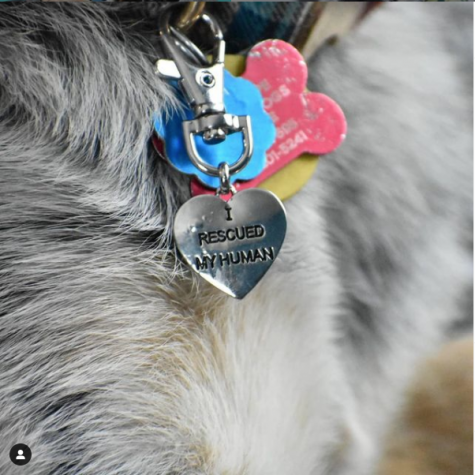
Today Tipsy’s account, tipsy_talks, has almost 900 followers and has earned Hall a lot of attention within the AAC community. In fact, she has become an official affiliate of Fluent Pet, the company that produces Tipsy’s buttons. This partnership means that Hall will receive commission from any purchase made through her affiliate link, but instead of keeping the proceeds she is donating every cent to New Hope Cattle Dog Rescue, the organization that initially rescued Tipsy and the other puppies in her litter from a kill shelter.
You can be a part of Tipsy’s journey and watch her use her buttons by following tipsy_talks on Instagram.
“The craziest thing I’ve learned from this experience is that animals also have the same need and want to communicate with us,” Hall said. “If you’re thinking about teaching your dog to talk do it.”
